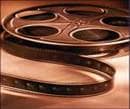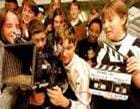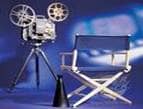Introduction
Film is considered as one of the most powerful media for communication. Making of film should be a blend of creativity and technicality which should be entertaining and informative to the public. Film making include feature films, documentaries, newsreels, Promotional films, TV commercials, music Videos etc.



• Development. The script is written and drafted into a workable blueprint for a film.
• Pre-production. Preparations are made for the shoot, in which cast and crew are hired, locations are selected, and sets are built.
• Production. The raw elements for the finished film are recorded.
• Post-production. The film is edited; music tracks (and songs) are composed, performed and recorded; sound effects are designed and recorded; and any other computer-graphic 'visual' effects are digitally added, and the film is fully completed.
• Sales and distribution. The film is screened for potential buyers (distributors), is picked up by a distributor and reaches its theater and/or home media audience.
In recent years documentary film making has captured lot of interests in students where teachers have discovered a new way to bring excitement into the classrooms and help students make meaningful connections to research topics. By introducing documentary filmmaking into their curriculum, they create an environment where all students are successful and motivated to do their best work. Documentaries give students the opportunity to express themselves using the tools of their generation. At the same time, they master basic skills - such as researching, reading, writing, and speaking. They also build critical 21st century skills including problem solving, collaboration, and gathering and analyzing data.
This is one of the fast emerging fields of media technologies. This revolution in motion picture distribution involves more than just a comparison of the quality of electronic filmmaking techniques as against conventional filmmaking. It provides an opportunity to meet many of the present and future requirements to all those involved at all levels of motion picture making -- from directors and producers to script writers, costume designers, make-up specialists, art directors, cinematographers, production mixers, editors, SFX specialists and finally the publicists. The process of making a digital film is almost similar to that of a conventional film. More and more film productions are moving towards digital film because the screenplay demands digitally generated special effects.
This computer-generated source is currently printed onto film for duplication, distribution, and exhibition. However, this extra step of reprinting on film can be avoided if the material is delivered and presented in its purest digital form. As options for alternative entertainment open up for movie-going audience, studios and exhibitors are becoming more aware of the need to maintain consistently high quality in the filmmaking process. Businesses involved in quality assurance at theatres, such as THX and their Theatre Alignment Program ("TAP"), are growing in popularity as this need for consistent quality is recognized.
Guerrilla filmmaking refers to a form of independent filmmaking characterized by low budgets, skeleton crews, and simple props using whatever is available. Often scenes are shot quickly in real locations without any warning, and without obtaining permission from the owners of the locations. Guerrilla filmmaking is usually done by independent filmmakers because they don't have the budget to get permits, rent out locations, or build expansive sets. Also studios tend not to use guerrilla filmmaking tactics because they could be sued, fined, or get their reputation hurt.
This is the Art of Machinima Creating Animated Films with 3D Game Technology.DLP recently teamed up with former Lucas Films effects studios Kerner Optical and Tippett Studios to work on a stereoscopic 3D Trailer for their cinema projectors. Pushing this style of filmmaking forward was something they were all excited about, and they took me around Kerner Optical's facility and showed me the latest camera gear they used to make the 3D trailer.
It consists of two cameras - one facing straight forward in a horizontal orientation, and one facing straight down, in a vertical position. Between them sits a mirror, angled at roughly 45 degrees, that acts as a beam splitter, directing the image to the vertically facing camera and helping to create the 3D effect. While the vertical camera remains stationary, the horizontal camera slides from left to right. In doing so, the intensity of the 3D effect varies according to position as the pictures from the two cameras phase in and out. Once the camera has done its job, it's up to the viewing apparatus to carry out the rest of the magic.
Kerner Optical uses special LCD monitors with the ability to display 3D images with the help of polarized glasses. Many rear-projection DLP televisions actually do the same thing, but a lack of content support has kept the technology obscured from most owners. Many people in the industry are pushing for 3D filmmaking to take off, as they think it's the next big technical innovation in movie production. Personally, I'm all for it, because it really is fun to watch, but until the industry finds a way to get the same effect without glasses,
The film making field is highly competitive and vast that has a lot of scope for employment opportunities. Candidates can find employment with
• Film Studios
• Production Companies
• Advertising Agencies
• Government Department
They can also start their own venture as
• actor - should be able to take in the directors requirement and reach the public
• producer - is the decision making authority and over all in charge of a film.
• director - he is responsible for the management in charge of all the creative aspects that go into the making of a film.
• editors - he who puts the film in correct sequential order synchronizes the sound track.
• cinematographer - he is involved in the planning and execution of a shoot.
• cameramen - handles the camera and the camera assistants
• soundmen - responsible for all sounds or effects that accompany visual images
• lighting crews - determine lighting effects needed during each shot.
• film critic - authoritatively write about the subject
• film archivist - involved with the collection, arrangement and provision and preservation of archives.
CELEBRITIES IN THE FIELD OF FILM TECHNOLOGY
Steven Allan Spielberg, KBE (Hon), (born December 18, 1946 is an American film director and producer. Forbes magazine places Spielberg's net worth at $3 billion. In 2006, the magazine Premiere listed him as the most powerful and influential figure in the motion picture industry. Time listed him as one of the 100 Greatest People of the Century. At the end of the twentieth century, Life named him the most influential person of his generation in a career that spans almost four decades, Spielberg's films have touched many themes and genres. During the 1970s, 1980s, and 1990s, three of his films, Jaws, E.T. the Extra-Terrestrial, and Jurassic Park became the highest grossing films for their time. During his early years as a director, his sci-fi and adventure films were often seen as the archetype of modern Hollywood blockbuster filmmaking. In later years, his movies began addressing such historical issues as the Holocaust, slavery, war, and terrorism.
Robert De Niro launched his prolific motion picture career in Brian De Palma's The Wedding Party in 1969. By 1973 De Niro twice won the New York Film Critics' Award for Best Supporting Actor in recognition of his critically-acclaimed performances in Bang the Drum Slowly and Martin Scorsese's Mean Streets. In 1974 De Niro received the Academy Award for Best Supporting Actor for his portrayal of the young Vito Corleone in Godfather Part II, The (1974). In 1980 he won his second Oscar, as Best Actor, for his extraordinary portrayal of Jake La Motta in Scorsese's Raging Bull (1980). De Niro has earned Academy Award nominations for his work in four additional films: for his role as Travis Bickle in Scorsese's acclaimed Taxi Driver (1976), as a Vietnam vet in Michael Cimino's Deer Hunter, The (1978) as a catatonic patient brought to life in Penny Marshall's Awakenings, and in 1992 for his role as Max Cady, an ex-con looking for revenge, in Scorsese's remake of the classic Cape Fear (1991). De Niro takes pride in the development of his production company, Tribeca Productions, and the Tribeca Film Centre, which he founded with Jane Rosenthal in 1988. Through Tribeca he develops projects on which he serves in a combination of capacities, including producer, director and actor.
Horoscope - Career for Zodiac Signs
So if you have the artistic flair and creative instinct and if your sun signs are in favour of this field then this is the right discipline for you to take up.
 Taurus
Taurus
 Leo
Leo
 Libra
Libra
 Pisces
Pisces
Eligibility : Click here for more information
Institutes : Some of the prominent institutions offering courses in Film Making can be had from the following links.. Click here for more information